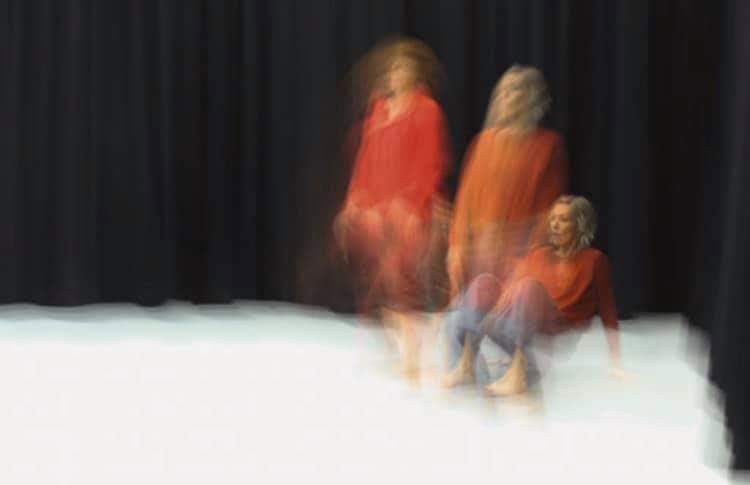Resolution 2020: Kindred & Judd, Parbati Chaudhury, Grand Gesture
Posted: February 20th, 2020 | Author: Nicholas Minns | Filed under: Festival, Performance | Tags: Andy Newman, Bruce Currie, Gilly Hanna, Grand Gesture, Guy Lombardo, Helen Kindred, Jesse Bannister, Maga Judd, Mary Cox, Meera Patel, Parbati Chaudhury, Resolution 2020 | Comments Off on Resolution 2020: Kindred & Judd, Parbati Chaudhury, Grand GestureResolution 2020, Kindred & Judd Collective, Parbati Chaudhury, Grand Gesture, January 29

A theme of this Resolution triple bill of the Kindred & Judd Collective, Parbati Chaudhury and Grand Gesture is the linking of the individual’s everyday struggle with, respectively, identity, pain and old age.
In aGender, Helen Kindred and Maga Judd confront their quest for identity in the continuous juggling of roles, expectations, and norms. Garments scattered around the stage are metaphors for the way in which identities are constructed, adapted and articulated. As the audience walks in, Kindred is wandering from pile to pile, selecting, putting on and taking off items of clothing with the timeless nonchalance of one accustomed to improvising; Judd is already exhausted by the process and is resting, camouflaged, on a pile of clothes. But not for long; soon dresses are pulled over their heads like playful tokens of subversion and liberation as they both drop on all fours and scamper around to Judd’s mix of Polish and English endearments until she screams and time comes to a deafening stop. As much a performance of rebellion as it is an affirmation of dogged persistence, aGender continues with the repeated rhythmical motif of falling and getting up, in which an endearing sense of mutual help and friendship develops between the two women that borders on the euphoric. The dancers pile layers on layers to the point they impede their movement; Kindred succumbs to the load, but Judd cannot help her: ‘I have to go,’ she says, ‘I have no time.’ Judd’s score, which acts like a ground from which the colours and textures emerge, now goes into reverse with a joint refrain from the two performers prefixing a familiar list of tasks for which they have no time, a refrain of the perpetual attempt to keep up with professional, domestic and social roles to the point of exasperation. While such a search for identity resonates with the history of feminism and established constructions of womanhood, the ambiguity of the final gestures — both achievement and exhaustion — suggests the struggle continues.
Sigmund Freud’s formulation of the concept of trauma emerged from his observation of the belated psychological pain suffered by patients who had been involved in railway accidents that had caused them only minor concussions or injuries. In Fader, choreographer Parbati Chaudhury links questions around the persistence of pain with two emblems of modernity that are deeply implicated with colonialism — the system of railways and the discipline of psychoanalysis — and reinterprets them through kathak dance movement. In the opening, Meera Patel’s kneeling body sways forward and back as if on a journey; her hands move continually to a source of pain in her side until it resolves. The work is episodic, divided both into different states of pain by choreographic gesture and into different spatial areas by judicious lighting and haze. While there are some unresolved tensions between dynamic representation and static illustration, Fader is an evocative expression of trauma that Patel’s lyrical qualities, poise and acute musicality help to convey. She is helped by Jesse Bannister’s score, composed for sarod, guitar, and bass, on which she dances like an additional instrument, creating together a choreographic and musical journey of richly rewarding cross-cultural fertilization.
Grand Gesture’s That Old Feeling introduces four ‘geri-anarchists’ — a new identity designation — who explore attitudes to ageing. The work examines the ambiguity of age between subjective sensation and societal expectation, throwing down the gauntlet in a riotous affirmation of the former. Depositing themselves centre stage in plastic bags at the beginning of the work, Mary Cox, Bruce Currie, Gilly Hanna and Andy Newman collectively embody the recorded litany of derisive epithets used to describe older people, from ‘old git’ and ‘duffer’ to ‘coffin dodger’. It’s a dark, hard-hitting image that quickly loses its satirical bite to self-mockery; the four geri-anarchists climb out of their bags in long white coats and subvert the lyrics of Guy Lombardo’s That Old Feeling by acting out the physical attributes of ailing. In the subsequent series of solos and ensemble numbers, however, subverting lyrics turns into subverting assumptions, no more so than in Currie’s enthusiastic belly dance number. The danger of using assumptions about age in order to flaunt them is that the manner of flaunting becomes a new meme that perpetuates the original assumptions. Cox breaks the mould by creating choreographic impressions of her memories, but within the piecemeal construction of the work, her subtle contribution is overpowered by the irrepressible desire of Grand Gesture to forcibly ‘shake off the cloak of elder invisibility’.